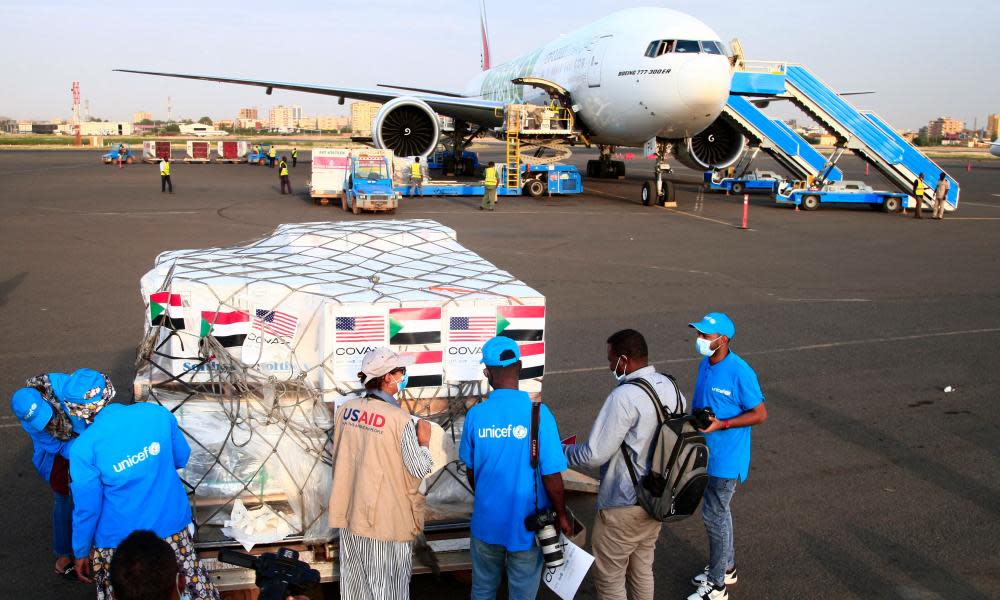UK falling behind most G7 countries in sharing Covid vaccines, figures show

The UK is lagging behind other G7 countries in sharing surplus Covid vaccines with poorer countries, according to newly published figures.
The advocacy organisation One, which is campaigning to end extreme poverty and preventable disease by 2030, described it as shaming for the UK government.
The figures show that the UK is behind every member of the G7 – of which Britain is currently the chair – except for Japan.
Romilly Greenhill, One’s UK director, said the number of vaccines the UK is committed to sharing this year is half that promised by France, less than a a third of Germany’s, and a tenth of that pledged by the US. She said: “We hosted the G7 this year. We are claiming global leadership in vaccine rollout, but when you look in detail at the level of ambition we are showing, we are falling way behind other major economies.
“In a critical week with the G20, the spending review and the Cop26, we are weakening our international reputation.”
Related: UK facing ‘another lockdown Christmas if we don’t act soon’
The One figures, released by the analytics company Airfinity, show the EU committed to sharing 200m doses by the end of 2021, the US 280m, France 60m, Germany 100m, Italy 45m, Canada 41.5m and the UK 30m. The latest figures also show that the UK has so far distributed only a third of the vaccines it has pledged to this year.
The UK had an opportunity to lift the level of commitment it first made at the G7 summit in June when Joe Biden convened a further pledging conference during the UN general assembly in September, but the UK made no announcements, and the prime minister, Boris Johnson, did not even attend.
At the UN summit, Biden increased the level of US commitment, saying: “For every one shot we’ve administered to date in America, we have now committed to do three shots to the rest of the world.”
Greenhill said: “The UK government is being extremely cautious about the vaccines it needs for the domestic rollout. We understand the concerns around the domestic situation, but from a moral perspective it is wrong that a lot of people in the UK are getting their third dose when even health workers in low-income countries have not had a single dose.
“There is a wider practical self-interest point – if we are to end the pandemic we really need to vaccinate the world so we get the global economy back on track.”
She added that there was no sign the UK could justify the disparity in vaccine distribution pledges on the grounds of suffering uniquely difficult supply-side constraints. The UK is committed to sharing 80% of its 30m vaccines this year through the global purchasing and distribution mechanism known as Covax, with the remainder distributed bilaterally.
The UK’s stated plans are more ambitious for vaccine distribution in 2022, promising to distribute 100m vaccines by the end of next year, the same target as Germany, but less than France, the EU and the US. However, the One campaign said it was critical that doses were distributed quickly so they would be available for use this winter rather than in spring. “Speed really matters,” Greenhill said.
The One figures dovetail with a call made by the former prime minister Gordon Brown for an emergency airlift of surplus vaccines. He calculates that there are 240m unused vaccines worldwide that, if deployed to the right countries, could save 60,000 lives.
Brown, who was appointed last month as an adviser to the World Health Organization, called on the G20 to back “the biggest peacetime public policy decision” by supporting an October airlift to send unused vaccines to parts of the global south that are in the most need.
At the G7 summit, the UK said its vaccine dose-sharing costs would be counted as additional to the overseas development assistance (ODA) budget, but in recent weeks that has been brought into question. Greenhill said that if the vaccines costs were included as part of ODA, the impact could be as much as £1bn on the rest of the aid budget.
The precise cost of dose-sharing per country is hard to calculate because of the lack of transparency about the original cost of the doses.

 Yahoo Movies
Yahoo Movies 
